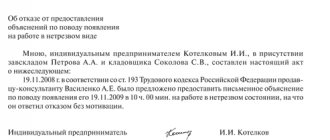Law firm Shmeleva and Partners
Labor law
140
Every employer sooner or later wonders how to fire an employee without breaking the law. There are few methods provided for by the Labor Code of the Russian Federation. They do not always help get rid of an employee, which creates many problems. For such cases, several options were provided for allowing an employee to be dismissed at the initiative of the organization’s management.
Features of dismissal of an employee for certain reasons
To avoid violations of personnel legislation, we suggest understanding how the dismissal of an employee should be formalized in the most common cases of termination of employment. When dismissal for other reasons, it is imperative to understand those provisions of the Labor Code of the Russian Federation (articles listed above) that govern a specific case.
Dismissal of an employee at his own request or by agreement of the parties
The employee must inform about the decision to voluntarily resign in writing no later than two weeks before the dismissal (Article 80 of the Labor Code of the Russian Federation). The resignation letter is submitted by the employee in person or by registered mail. The two-week work period may not be observed if the employer agrees to dismiss the employee earlier . The notice period for voluntary dismissal is reduced to three days if the employee quits during the probationary period, he was employed in seasonal work, or the contract was concluded with him for a period of up to two months.
In addition, an employer cannot refuse to dismiss an employee without working for two weeks if:
- the employee’s rights enshrined in the employment contract were violated, and this violation was recorded by a court or labor inspectorate;
- the employee cannot continue working due to retirement, enrollment in studies and other important reasons.
What if the employee changes his mind about quitting? Yes, this also happens: I wrote a letter of resignation of my own free will and, after working the required two weeks, decided to continue working for the benefit of my former employer. It is impossible to fire such an employee, even if he changes his mind on the last working day, and another candidate is found to take his place. An exception is possible only for one rather rare situation - if an employee was invited in writing to replace the resigning employee by transfer from another company.
The preparation of documents in the case of an employee who has changed his mind about resigning depends on whether the order for his dismissal was signed at that time. If the order has not yet been signed, then the employee must only write a request to withdraw the resignation letter. If a dismissal order is issued, an entry is made in the work book, wages and compensation are calculated, a calculation note is drawn up, then the issued order must be canceled, the entry in the work book is canceled, and the compensation paid is returned.
Another nuance related to the desire of a resigning employee to remain at work is if an application for leave with subsequent dismissal was submitted. In this case, the employee must inform him that he has changed his mind before going on vacation, otherwise he cannot withdraw his resignation letter.
With voluntary agreement to terminate the employment contract, dismissal is possible not only at the request of the employee, but also by agreement of the parties . The agreement stipulates the date of termination of the employment relationship (this period is not regulated by anything) and, in some cases, the payment of additional compensation to the employee. This dismissal option may be convenient if the employee must complete a certain amount of work, for example, take inventory or submit reports, which requires more time than two weeks. The employee will not be able to unilaterally refuse the agreement of the parties, unlike a statement of his own free will.
Dismissal based on probationary period
If an employee was hired under a test condition that he failed to meet, he may resign by submitting an application of his own free will. If he does not want to resign voluntarily (although this is in his interests, since recording a dismissal for such a reason harms his reputation as an employee), then the employment contract can be terminated at the initiative of the employer. The employee must be notified of dismissal on this basis three days before the termination of the employment relationship, in writing and indicating the reasons for such a decision.
Such motives could be:
- a report from the immediate superior about how the employee performed;
- complaints from clients or customers about an employee;
- written reports from the employee himself indicating the work done during the probationary period;
- acts stating that the employee does not fulfill the plan or production standards;
- disciplinary offense committed by the employee;
- other explanations that prove that the employee is not suitable for the job for which he was hired.
If an employee refuses to sign a notice stating that he has not completed the probationary period, a separate report must be drawn up about this, indicating witnesses.

Dismissal of an employee for absenteeism
Absenteeism is the absence of an employee from the workplace without good reason for more than four hours in a row during a working day or shift (Article 81(6) of the Labor Code of the Russian Federation). It is advisable to spell out exactly what reasons can be considered valid in a labor or collective agreement. If disagreements arise on this matter, the weight of the reason for the employee’s absence will have to be established in the labor dispute commission or in court. Absenteeism is also considered to be situations where an employee voluntarily went on vacation (time off) or did not warn the employer about early termination of the contract or about voluntary dismissal.
The fact of absenteeism must be documented, that is:
- Make a note on the time sheet. While the reason for the employee’s absence is unclear, the report shows Fr. If it later turns out that the employee is sick and submits a certificate about this, then the mark must be changed to “B”, but if the fact of absenteeism is confirmed, then Fr.
- Send the employee a written notice requiring him to explain the reasons for absence from work. The employee is given two working days from the date of receipt of the notice to provide explanations.
- Draw up an act of absence of the employee from the workplace or a memo from the immediate superior addressed to the head of the organization or individual entrepreneur. The period of employee absence is indicated in hours and minutes.
If the employee’s absence lasted one or two days, he could not give an explanation for his absence or refused to give an explanation (which requires drawing up a report), then everything is quite simple. Based on all the collected documents confirming the fact of absenteeism, the employer issues a dismissal order, which is given to the employee against signature within three working days or sent to him by registered mail. The date of dismissal of the employee will be the last working day before absenteeism. Days when the employee was absent for unexcused reasons are naturally not paid.
But what to do when an employee disappears for several days, does not answer calls, it is impossible to contact him in other ways and give him a notice demanding to explain the reasons for his absence from work? What if he moved to another city altogether? The employer has no obligation to search for the employee, but in order to protect himself in the event of a labor dispute, he will have to draw up an absence report for the employee every working day. The Labor Code does not provide any guidance on when you can stop trying to contact a missing employee and fire him, but, of course, the wait cannot last forever.
With the wording “dismissed for absenteeism,” an employee can be fired only within a month after the fact of his first absence from work was recorded, and it is assumed that it was still possible to contact the employee and make sure that he was absent for unexcused reasons. In practice, employers go so far as to issue a dismissal order for absenteeism, after drawing up the relevant acts on a daily basis and repeatedly sending written notices to the employee’s home address during the month, although this is formally unacceptable. Until the employee is found and explanations are received from him, he cannot be fired for absenteeism.
In addition, there is a risk that the employee who shows up will sue, and if, indeed, the reasons for his absence are recognized by the court as valid, then the employer will have to reinstate the employee and pay him for all missed days. It must be said that the court does not always take the side of such workers. The claim may be rejected even if the employee was sick, that is, absent for a good reason, but at the same time, having such an opportunity, did not report the reason for his absence from work.
The safest thing to do is to wait for the employee for a year (in any case, he is not paid a salary for these days, and his work is performed by other employees), and then go to court with a claim to declare the employee missing. After receiving such a court decision, the employee’s dismissal occurs under Article 83(6) of the Labor Code of the Russian Federation.
Dismissal due to reduction in headcount or staff
The option of dismissing an employee due to layoff is difficult for the employer to document and involves payment of compensation to the employee in the amount of up to three monthly earnings (Article 178 of the Labor Code of the Russian Federation).
First of all, you need to issue an order to reduce the number or staff and report this two months before the reduction to the employment service and to the trade union (if there is one). Next, it is necessary to determine which of the employees, according to Article 179 of the Labor Code of the Russian Federation, has a preferential right to retain their job. It must be borne in mind that the following categories of workers cannot be dismissed due to redundancy:
- employees on vacation or sick leave;
- pregnant women;
- women with children under three years of age;
- single mothers (or workers raising a child without a mother) with children under 14 years of age or a disabled minor child.
After a list of employees who have been laid off has been compiled, each of them must be notified in writing at least two months before the expected date of dismissal. If the employer has any other vacancies, including lower-paid ones, they must be offered in writing to the laid-off employee, and if he agrees to this, arrange a transfer to another job.
Dismissal due to expiration of the employment contract
In general, an employment contract is of unlimited duration, but there are a number of reasons why employment relations are concluded for a certain period. At the same time, the expiration of the employment contract itself does not constitute grounds for its termination, therefore one of the parties (the employer or the employee) must demand this.
True, there are a number of situations when it is not necessary to notify about the expiration of the contract in order to terminate it:
- the contract involves the performance of certain work that is completed by the employee;
- the contract was concluded for the duration of seasonal work and this season is completed;
- the employee was hired to perform the duties of the absent employee, and he returned to his work duties.
In all other cases, the employee must be notified by signature three days before the end of the employment contract. If the parties wish to continue the employment relationship, then they only need to draw up an additional agreement to the contract stating that it is considered concluded for an indefinite period. Naturally, the employee is not fired in this case.
In this case they will help you
1. Colleagues.
Talk to your colleagues - perhaps someone will agree to testify in court in your favor. But most likely, the company's employees are in the same precarious position, and any action against the boss threatens them with the same consequences.
2. Bank account statement
If the employer regularly transferred the same amount to your card, then a bank account statement will help in court to prove the fact of payment for the work performed.
3. Smartphone
The phone may contain correspondence with the manager, which will also serve as evidence in court.
Thus, in one of the disputes regarding the establishment of labor relations, “printouts on the social network “VKontakte” with notarized screenshots from an Internet page” were some of the evidence on the basis of which the court satisfied the employee’s demands (Appeal ruling of the Volgograd Regional Court dated May 24, 2018 to case No. 33-6786/2018).
The court may consider “screenshots from the social network Instagram”, “e-mail correspondence and audio recordings of voice messages in a group created by the employer in the WhatsApp messenger”, in which the parties discussed the schedule for receiving clients for the massage procedure, work schedule, order and the amount of wages paid for the massage sessions performed" (Appeal ruling of the Omsk Regional Court dated November 28, 2018 in case No. 33-7850/2018).
Currently, there is quite an extensive and diverse judicial practice in labor disputes, in which data from social networks or instant messengers is used as evidence.
Correspondence between an employee and an employer in disputes about establishing the fact of an employment relationship should indicate not only that such an employee was hired by this particular employer, but also that:
- the employee is allowed to perform a predetermined job function;
- the employee has become familiar with the internal labor regulations and obeyed them;
- The employee was given a specific amount of wages that he would receive for his work.
4. Company documents, waybills, goods and invoices, which you signed in your own hand, are also suitable.
If the evidence is collected in the form of screenshots, it is better to have it notarized. Otherwise, the judge may have doubts.
So, if the evidence has been collected, you can file a claim in court with the following requirements:
- establish the fact of labor relations;
- draw up an employment contract and make an entry in the work book;
- recover wages and compensation for delays;
- pay compensation for moral damage;
- recover the average salary for the period of inactivity - from the moment of dismissal until the court decision comes into force;
- recover legal costs when drawing up a claim by a lawyer.
You can prove the amount of your salary with a bank account statement, if the employer transferred the salary to the card, with an accountant’s testimony, or with a screenshot of a vacancy from the company.
If you cannot provide such evidence, provide statistics from websites about the salary of a specialist for the same position.
Remember, the fact of establishing (coordination) of wages in the amount declared by the plaintiff is subject to proof by the plaintiff in accordance with Art. 56 of the Code of Civil Procedure of the Russian Federation, however, if such evidence confirming the fact of setting the salary is not provided to the court, then the arrears of wages can be recovered based on the amount of the minimum wage.
Procedure for registration of dismissal
The procedure for formalizing the termination of an employment contract is given in Article 84.1 of the Labor Code of the Russian Federation:
- on the termination of an employment contract with an employee in form No. T-8 . Naturally, before issuing an order, the dismissal procedure must be followed for a specific reason (a voluntary application has been accepted; an agreement between the parties has been signed; the fact of absenteeism has been established; the employee has been warned in writing about the expiration of the employment contract, etc.). The employee must be familiarized with the dismissal order against signature, and if this is impossible to do or the employee refuses to sign, then a note is made about this.
- On the day of dismissal, the employee must complete and make a full payment in form No. T-61 (that is, unpaid wages; compensation for unused vacation, if any; other mandatory payments). Cases in which an employer must pay compensation to a dismissed employee are specified in Chapter 27 of the Labor Code of the Russian Federation. In addition, they may be provided for in an employment contract or agreement of the parties. If the employee disputes the amount of payments, then the employer must pay out on that day at least the amount with which he agrees.
- On the day of termination of the employment relationship, the employee must be given a work book with a record of dismissal, as well as a certificate of the amount of salary and other payments on which insurance premiums were calculated. In writing, the employee can also request certified copies of other documents related to his work. If the employee is absent on the day of dismissal, the employer must send a notice to the employee at his home address about the need to appear for a work book or agree to receive it by mail.
Lawyer: It’s realistic to defend rights
Olga Bobyleva , a lawyer at the Moscow Bar Association “Anti-Crisis Center,” has a different opinion .
“In fact, admission to work is considered the conclusion of an employment contract,” she emphasized. — Even if an employment contract has not been concluded, but a person worked and received wages, and he can prove this, then it is considered that an employment contract has been concluded with him. And, of course, he is subject to all the rules provided for by labor legislation.”
According to the lawyer, if the employee was paid wages, then there should be statements in which this fact was recorded.
“Perhaps the employer transferred funds to the employee’s bank card. If there is such evidence, it must be presented; if not, one of the employees probably saw how this person worked, performed specific work,” the lawyer said.
In this case, it is necessary to attract witnesses and prove that an employment contract was concluded, since the employee was allowed directly to work and performed it, suggested Olga Bobyleva.

FBA "Economy Today" /
Where can a fired employee complain?
If an employee believes that he was fired illegally, and in some cases simply to cause trouble for his former employer, he has the right to appeal to the labor inspectorate, the prosecutor's office or the court.
The labor inspectorate may limit itself to requesting documents on a dismissed employee, or it may conduct an unscheduled inspection of the employer, and then all personnel documents will be checked. If the personnel documentation is kept in order, and the documents on the dismissal of the employee who caused the inspection clearly prove that the employer is right, then there is nothing terrible for him in such an inspection. If the labor inspectorate recognizes that the employee was dismissed illegally, it will issue an order to reinstate the employee. Disagreement with the order will have to be challenged in court, and for violating the terms of reinstatement at work, a fine may be imposed under Art. 19.5 of the Code of Administrative Offenses of the Russian Federation (up to 20 thousand rubles per organization and up to 2 thousand rubles per official).
A complaint from a dismissed employee to the prosecutor’s office most often results in the same labor inspectorate dealing with the issue, but the prosecutor’s employees themselves can appear to the employer without warning. They cannot issue an order to reinstate the employee, but they are obliged to transfer the case of violation of his rights to the court (if such facts have been discovered).
An employee can go to court on his own, or documents on his case can be filed by the labor inspectorate (or the prosecutor's office). If the court sides with the employee, the employer must:
- issue an order canceling the previous dismissal order;
- reinstate the employee to his previous workplace;
- cancel the dismissal entry in the work book or issue a duplicate work book without this entry;
- pay the employee wages during forced absence;
- pay compensation for moral damage if specified in the court decision.
Of course, one can hardly expect normal labor relations after the employee is reinstated at work through the courts, so it is in the employer’s interests to comply with all norms and deadlines for dismissal for various reasons.
Deputy: Going to court is more expensive for yourself
The Chairman of the State Duma Committee on Labor, Social Policy and Veterans Affairs, Yaroslav Nilov, in an interview with FAN, stated that it was precisely this category of citizens that the coronavirus “hit” the hardest.
“Due to restrictive measures, the judicial system was subject to certain adjustments,” the deputy noted. “We can already say for sure that those who were in the “black” or “gray” zone, of course, suffered seriously.”
The fact is that those who received their salary unofficially, “in an envelope,” do not have an employment contract, Nilov explained.
“In this case, all labor relations are informal. In this regard, all appeals to the court, labor inspectorate and prosecutor’s office will be useless from the point of view of restoring violated rights,” the FAN interlocutor is sure.
According to the parliamentarian, such appeals are even fraught for the former employee, because he, receiving his salary in an envelope, evaded paying income tax, which is an offense. And if we are talking about a large salary, then it is also a crime - up to criminal liability, the deputy clarified.
“How to restore rights? Who will the employee file a claim against? To the employer? He legally does not have an employer! He has an understanding that this person was his employer, but this cannot be legally confirmed,” added the head of the State Duma Labor Committee.
If such an ex-employee even manages to confirm that he worked, he thereby admits that he received illegal income on which tax was not paid.
“This may entail certain legal consequences,” warned Yaroslav Nilov.

/ Federal News Agency






